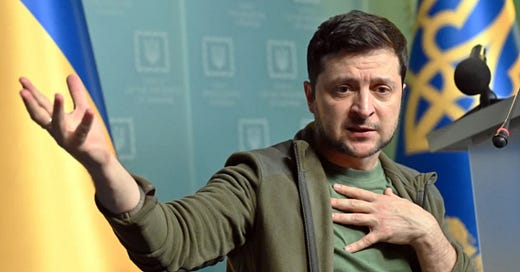What was Zelensky thinking?
Last week’s false claim about a missile strike in Poland carries two important lessons
Last week, after a missile landed in Poland and killed two people, Ukrainian President Volodymyr Zelensky sat down and taped a video in which he said, “Hitting NATO territory with missiles… This is a Russian missile attack on collective security! This is a really significant escalation. Action is needed.”
In using the term “collective security,” Zelensky was invoking the principle at NATO’s core—that an attack on one member is an attack on all. So it’s hard to interpret his “Action is needed” as anything other than a call for NATO to enter the war against Russia.
Later, after American and Polish officials concluded that the missile had been fired by Ukraine in an attempt to hit an incoming Russian missile, critics of Zelensky sprung into action. He was recklessly hasty in his judgments, they said—or, worse, he had known the missile’s true origins all along and was being willfully deceptive.
On Fox News, Tucker Carlson suggested that maybe “he’s lying on purpose to get us into a war?” Maybe, Carlson continued, “he's just another corrupt eastern European strongman in a tracksuit getting as rich as he can from American handouts?" Right-wing commentator Matt Walsh imagined even darker motivations. “Zelensky is one of the most dangerous psychopaths on the planet right now,” Walsh tweeted to his 1.1 million followers. “He is determined to start another world war.”
Here’s another theory: Maybe Zelensky was just doing his job. He’s president of a country that got invaded by a bigger country and is fighting for its life. Naturally, he’d like NATO to join the war. Wouldn’t you? It’s only human for him to seize on developments that might lead to that outcome and amplify them—and not pause to subject them to the kind of critical scrutiny that might get in the way.
And what if he did know that the missile was Ukrainian but figured that a little deception in the service of a noble cause isn’t a bad thing? That belief wouldn’t exactly be unprecedented in a wartime leader.
One virtue of seeing Zelensky’s behavior as part of his job description is that it underscores something that many people in the US foreign policy establishment seem to consider it impolite to talk about: Ukraine’s interests differ from America’s interests and the interests of European members of NATO. Paying more attention to this fact could improve American policy toward Ukraine—quite possibly in ways that turned out to be good not just for America, but for Ukraine and Europe broadly.
Seeing Zelensky’s behavior as part of his job description also underscores something else that deserves more discussion than it’s gotten: We shouldn’t uncritically accept the picture of the war we’re getting in mainstream media. The Ukrainian government has lots of control over the information coming out of the war zone, and if it didn’t use that control to shape public opinion, that would make it a very unusual kind of wartime government.
As it happens, these two facts—that interests can differ among allies and that the picture we’re getting of this war isn’t wholly reliable—are connected: It’s going to be hard to wisely use our understanding of these differing interests if we’re not mindful of the distortion that afflicts information emanating from Ukraine.
Before I explain exactly what I mean by that, let’s take a closer look at the differences among—and the overlap among—the interests of Ukraine, Europe, and America:



